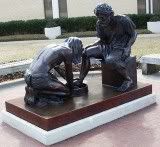DTS to graduate record number
Dallas Theological Seminary reports a bumper crop of grads, male and female, as well as international students. Here's a press release:
REACHING A MILESTONE:Okay, I hate to be the bad Ag here, but is this necessarily a good thing?
Dallas Theological Seminary Graduation Numbers Hit Record
DALLAS, May 10, 2007 – Dallas Theological Seminary (DTS) has hit another milestone: graduating 379 students this year – an all-time high for one of the nation’s largest non-denominational evangelical seminaries.
The new number follows several years of record enrollment.
A commencement service, to be held at 10 a.m. Saturday at Prestonwood Baptist Church in Plano, caps a week of graduation activities, including a special chapel service and a barbecue and reception to be held Friday.
The commencement address will be delivered by Dr. William Brown, president of Cedarville University in Ohio. Dr. Brown, a nationally recognized expert on worldview, is the author of three books and more than a hundred articles for scholarly journals, newspapers, magazines and encyclopedias.
“This is a special time for our seminary family,” said DTS president, Dr. Mark Bailey. “We are grateful for the increasing number of people each year who have chosen to attend Dallas Seminary.”
This year’s graduating class is especially diverse, Dr. Bailey said, and includes 278 men and 101 women. Nearly 30 graduates are from overseas.
I get (and have got) the impression that bigger is (necessarily) better where seminaries are concerned. But have any sacrifices been made to aid this achievement? Are the students as well prepared upon graduation? Is the incoming student at the same standard as before? What should be that standard? What is the minimum level of competence of a DTS graduate? Is that below the expectations of the churches?
Is DTS unique or are some of these questions valid across the theological landscape of institutions? Seminaries seem to compete with each other for students and even keep score of size of student populations, so there seems to an importance placed on such figures.
But, if we're inclined to say that bigger is not necessarily better with regard to a church, is the same true for a seminary?
To ask it another way, how do we gauge the quality of a seminary? What makes one better than the other, if not numerical growth? Is it percentage involved in full-time ministry after graduation? Is it number of books produced?
I'm not sure I have solid answers, but I'm curious as to your thoughts, as DTS alumni.



No comments:
Post a Comment